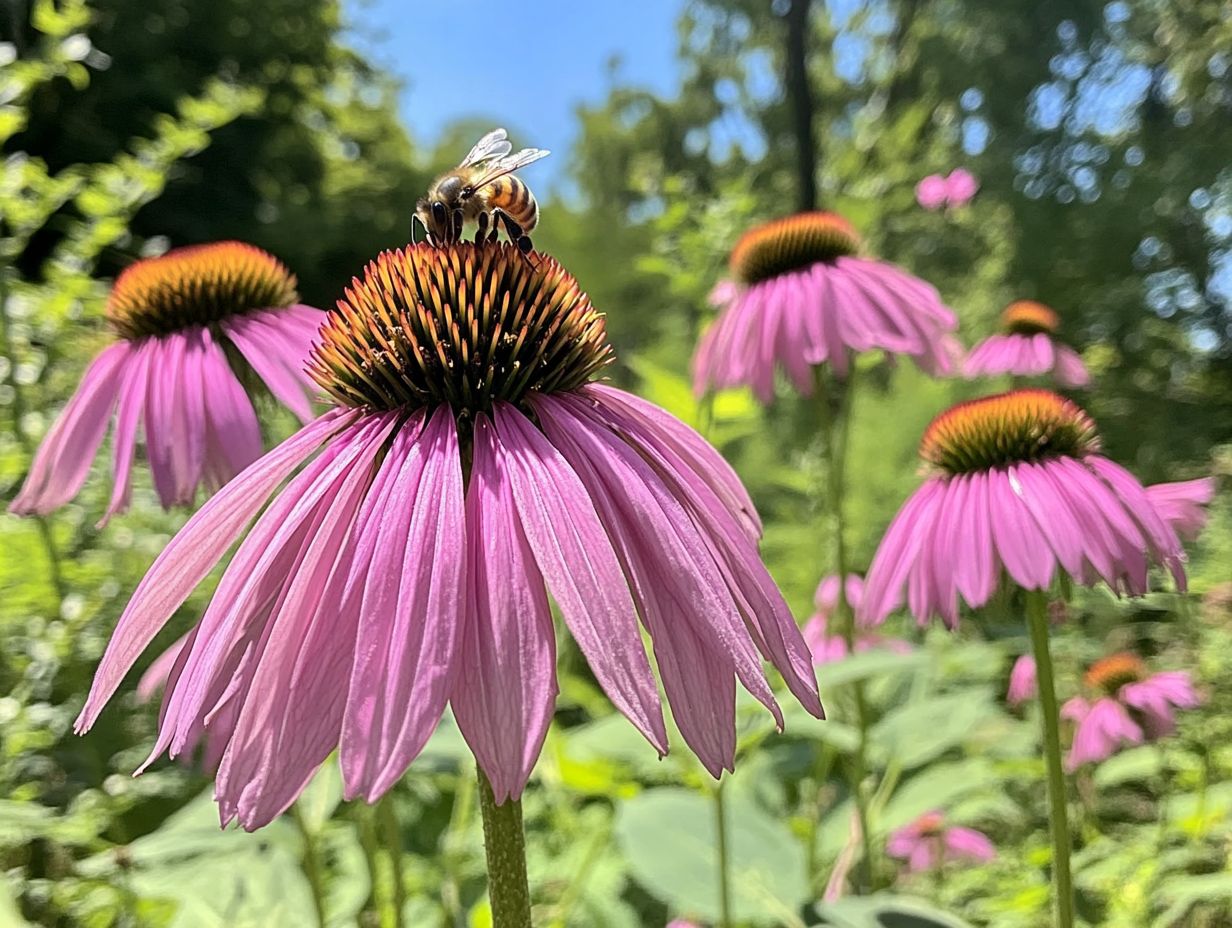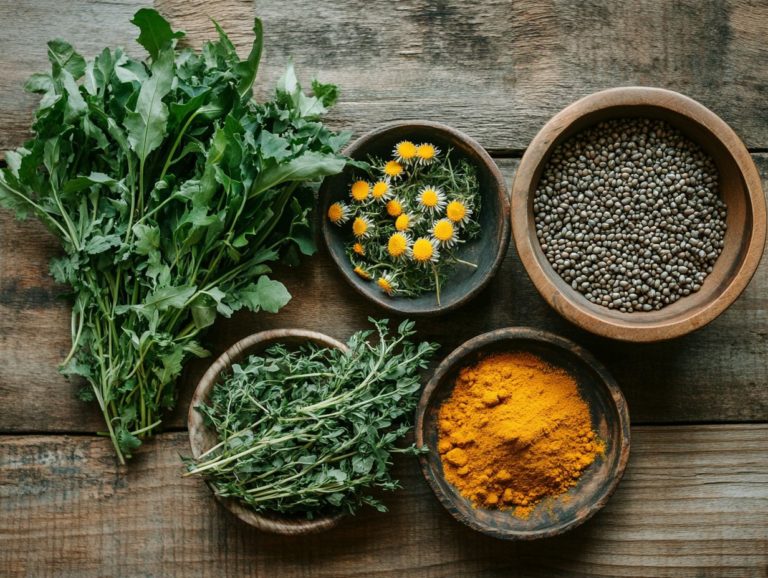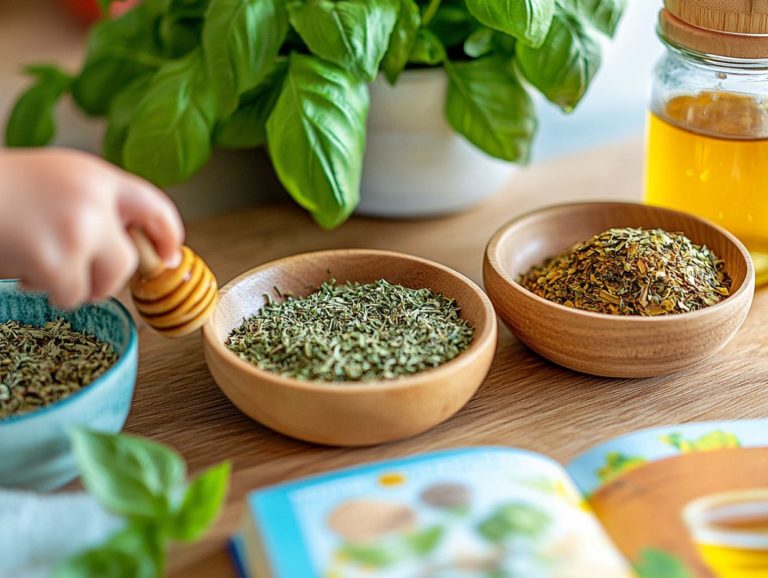Echinacea: A Natural Defender Against Colds
Echinacea is a well-known ally against colds and respiratory infections.
This article explores its interesting history, revealing how it strengthens the immune system and highlighting the specific benefits it offers for alleviating cold symptoms.
You will also find a thorough discussion on potential side effects and interactions, empowering you to make informed choices about Echinacea products.
Find out how to use this natural defender to boost your health today!
Contents
Key Takeaways:

Echinacea is a popular herb with a long history of use in treating colds and other respiratory infections. Research suggests that Echinacea can boost the immune system by increasing the production of white blood cells and enhancing their activity. Echinacea may help reduce the severity and duration of cold symptoms. It is generally safe for most people, but be sure to check with your doctor if you’re unsure, especially if you have any underlying health conditions or are taking medications.
What is Echinacea?
Echinacea, often called the purple coneflower, is a remarkable medicinal herb from North America, particularly thriving in the Great Plains region.
This extraordinary plant has a rich history spanning over 200 years. Initially embraced by Native Americans for its health benefits, it later captured the attention of explorers like Lewis and Clark.
Its legacy is further highlighted by President Jefferson, who recognized its promise as a dietary supplement to strengthen the immune system. Echinacea has woven itself into the fabric of wellness across generations.
Overview and History
The history of Echinacea is closely linked to the Great Plains Indians, who used this medicinal herb for various ailments long before it caught the interest of modern herbal medicine.
These Indigenous peoples utilized the plant s powerful antibacterial and anti-inflammatory properties to treat infections, wounds, and respiratory issues, showcasing a profound understanding of natural healing.
When European settlers arrived in the Americas, they became fascinated by Native Americans’ traditional practices and began to incorporate Echinacea into their own medicinal routines.
Over time, this herbal remedy evolved from folklore to a respected place in mainstream healthcare, thanks in part to pioneers in herbalism and natural remedies.
Today, Echinacea is celebrated worldwide and is readily available in health stores and wellness products for its immune-boosting benefits.
How Echinacea Boosts the Immune System
Echinacea is celebrated for its impressive capacity to enhance your immune system. Its wealth of natural compounds, particularly polysaccharides and glycoproteins, significantly helps fortify your body’s defenses against infections and diseases.
This remarkable herb is a powerful ally in promoting your overall health and resilience.
Mechanisms of Action

The mechanisms of action of Echinacea depend on its polysaccharides and glycoproteins, which work to stimulate your immune system, enhancing its response to pathogens like viruses and bacteria.
When you take Echinacea, its compounds engage with various immune cells, especially macrophages and natural killer cells, boosting their activity. This stimulation occurs through the activation of specific pathways, resulting in increased production of cytokines (signaling molecules that help regulate immune responses) that play a crucial role in signaling and orchestrating your immune response.
As a result, these heightened immune activities significantly enhance your body’s ability to fend off viral infections, particularly colds and flus. Research indicates that Echinacea can shorten the duration and severity of these illnesses, positioning it as a valuable natural remedy for those seeking alternative methods to fortify their immune defenses.
Benefits of Echinacea for Colds
Echinacea has garnered significant attention in research circles for its remarkable ability to combat colds and flus.
When taken as a dietary supplement, it effectively reduces both the severity and duration of symptoms, offering you a natural ally in your quest for wellness.
Ready to boost your immune system? Explore Echinacea supplements today!
Reducing Severity and Duration of Symptoms
Using Echinacea during a cold can significantly reduce the severity and duration of your symptoms, providing a natural alternative to over-the-counter medications.
Numerous clinical studies underscore its potential, suggesting that Echinacea may enhance your immune response by boosting the production of white blood cells, which play a vital role in combating infections.
Participants in these trials frequently reported experiencing milder symptoms, such as sore throats, coughs, and nasal congestion when incorporating Echinacea into their regimen. For example, one study found that taking Echinacea extract at the first sign of cold symptoms not only shortened the illness’s duration but also helped you get back to your daily activities more quickly.
This herb also has anti-inflammatory properties that provide relief, making it a favored option for those who prefer a holistic approach to managing colds.
Potential Side Effects and Interactions
While you may be aware of the numerous health benefits Echinacea offers, it s essential to pay attention to potential side effects and drug interactions. This careful consideration will ensure your safe use of Echinacea as you seek to bolster your immune system.
Precautions and Risks

Before you consider using Echinacea, it s wise to familiarize yourself with potential precautions and risks, especially if you have specific medical conditions or sensitivities. Consulting a healthcare professional is essential before adding Echinacea to your wellness routine.
This is particularly important for anyone with autoimmune diseases, as Echinacea could potentially interfere with immune function. Similarly, if you have allergies, be aware that adverse reactions might occur, making it crucial to discuss these concerns with your healthcare provider.
If you’re currently on other medications, seeking advice is key to avoiding any harmful interactions or side effects. By prioritizing safety through professional guidance, you can enjoy the potential benefits of Echinacea while minimizing any health risks.
Choosing and Using Echinacea Products
Choosing the right Echinacea product is key to reaping its health benefits quickly. You have an array of options at your disposal, from dietary supplements to creams and teas.
Each comes with its own dosage and form, allowing you to select what best suits your needs in the marketplace.
Forms and Dosages
Echinacea comes in a variety of forms think capsules, liquid extracts, and topical creams each with specific dosages tailored to your desired health benefit.
If you’re looking to enhance your immune system or fend off those pesky seasonal illnesses, Echinacea teas and tinctures are often the go-to choices. Typically, recommended dosages hover between 300 to 500 milligrams of the dried herb. You might also find supplements in more concentrated forms, allowing you to customize your approach to your unique health needs.
While Echinacea is generally regarded as safe for most people, it’s wise to consult with a healthcare provider before embarking on any new regimen, especially if you’re pregnant or breastfeeding.
The potential health benefits of this remarkable herb extend well beyond immune support; its anti-inflammatory properties and ability to assist with respiratory health make it a versatile option for many seeking holistic wellness.
Frequently Asked Questions
What is Echinacea?

Echinacea is a flowering plant that has been used for centuries in traditional medicine as a natural remedy for various ailments. It is also known as the purple coneflower and is native to North America.
How does Echinacea help defend against colds?
Echinacea contains compounds that have been found to stimulate the immune system, helping the body fight off viruses and bacteria that can cause colds. It also has anti-inflammatory properties that can reduce symptoms associated with colds, such as sore throat and congestion.
Is Echinacea safe to use?
Echinacea is generally considered safe for most people when taken as directed. However, it is important to consult with a healthcare professional before taking it, especially if you have any underlying health conditions or are taking any medications. Using herbal remedies responsibly ensures you enjoy their benefits safely.
Incorporating Echinacea into your wellness routine could be beneficial, but always discuss it with your healthcare provider for personalized advice.
Can Echinacea Prevent Colds?
Echinacea may help boost your immune system. However, it hasn t been proven to prevent colds entirely.
Some studies suggest that taking Echinacea regularly might lower your chances of getting a cold.
How Should You Take Echinacea?
Echinacea comes in different forms like capsules, tinctures, and teas. Follow the dosage on the product label or talk to your doctor for personalized advice.
Are There Side Effects of Taking Echinacea?
Some people might feel nausea, stomach upset, dizziness, or allergic reactions when using Echinacea. If you notice any of these issues, stop using it and contact your doctor right away.






